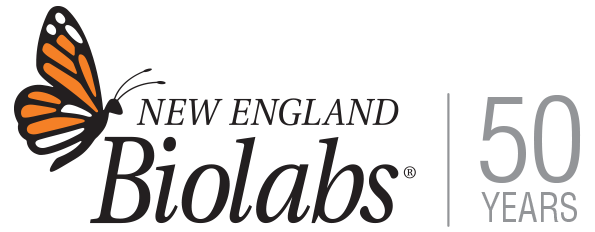PCR Protocol for OneTaq® Quick-Load® DNA Polymerase (M0509)
Overview
PCRThe Polymerase Chain Reaction (PCR) is a powerful and sensitive technique for DNA amplification. Taq DNA Polymerase is an enzyme widely used in PCR. OneTaq Quick-Load DNA Polymerase allows for greater amplification sensitivity across a wide variety of amplicons. The following guidelines are provided to ensure successful PCR using New England Biolabs’ OneTaq Quick-Load DNA Polymerase. These guidelines cover most routine PCR. Specialized applications may require further optimization.
Protocol
Reaction setup:We recommend assembling all reaction components on ice and quickly transferring the reactions to a thermocycler preheated to the denaturation temperature (94°C).
Add to a sterile thin-walled PCR tube:
| Component | 25 μl reaction | 50 μl reaction | Final Concentration |
|---|---|---|---|
|
5X OneTaq Quick-Load Buffer or 5X OneTaq Standard Reaction Buffer |
5 µl |
10 μl |
1X |
|
10 mM dNTPs (#N0447) |
0.5 µl |
1 μl |
200 µM |
|
10 µM Forward Primer |
0.5 µl |
1 μl |
0.2 µM |
|
10 µM Reverse Primer |
0.5 µl |
1 μl |
0.2 µM |
|
OneTaq Quick-Load DNA Polymerase |
0.125 µl |
0.25 µl |
1.25 units/50 µl |
|
Template DNA |
variable |
variable |
< 1,000 ng |
|
Nuclease-free water |
to 25 µl |
to 50 µl |
*For amplicons between 3–6 kb, use 2.5–5 units/50 µl rxn
Notes: Gently mix the reaction. Collect all liquid to the bottom of the tube by a quick spin if necessary. Overlay the sample with mineral oil if using a PCR machine without a heated lid.
Transfer PCR tubes to a PCR machine and begin thermocycling:
Thermocycling conditions for a routine PCR:
| STEP | TEMP | TIME |
|---|---|---|
|
Initial Denaturation |
94°C |
30 seconds |
|
30 Cycles |
94°C |
15-30 seconds |
|
Final Extension |
68°C |
5 minutes |
|
Hold |
4-10°C |
General Guidelines:
- Template:
Use of high quality, purified DNA templates greatly enhances the success of PCR. Recommended amounts of DNA template for a 50 µl reaction are as follows:
DNA Amount genomic
1 ng–1 µg
plasmid or viral
1 pg–1 ng
- Primers:
Oligonucleotide primers are generally 20–40 nucleotides in length and ideally have a GC content of 40–60%. Computer programs such as PrimerSelect™ (DNAStar Inc., Madison, WI) and Primer3 can be used to design or analyze primers. The final concentration of each primer in a PCR reaction may be 0.05–1 µM, typically 0.2 µM.
- Mg++ and Additives:
Mg++ concentration of 1.5–2.0 mM is optimal for most PCR products generated with OneTaq Quick-Load DNA Polymerase. The final Mg++concentration in 1X OneTaq Quick-Load Buffer or Standard Reaction Buffer is 1.8 mM. This supports satisfactory amplification of most amplicons. However, Mg++ can be further optimized in 0.2 mM increments using MgCl2 (NEB #B9021).
- Deoxynucleotides:
The final concentration of dNTPs is typically 200 µM of each deoxynucleotide.
- OneTaq Quick-Load DNA Polymerase Concentration:
We generally recommend using OneTaq Quick-Load DNA Polymerase at a concentration of 25 units/ml (1.25 units/50 µl reaction) for amplicons up to 3 kb. The optimal concentration of OneTaq Quick-Load DNA Polymerase may range from 5–100 units/ml (0.25–5 units/50 µl reaction). For specialized applications, including 3–6 kb amplicons, 2.5–5 units/50 µl reaction is recommended. Note that in some cases increasing the amount of enzyme in the reaction can be inhibitory.
- Denaturation:
An initial denaturation of 30 seconds at 94°C is sufficient to amplify most targets from pure DNA templates. For difficult templates such as GC-rich sequences, a longer denaturation of 2–4 minutes at 94°C is recommended prior to PCR cycling to fully denature the template. With colony PCR, an initial 2–5 minute incubation at 94°C is recommended to lyse cells.
During thermocycling a 15–30 second denaturation at 94°C is recommended.
- Annealing:
The annealing step is typically 15–60 seconds. Annealing temperature is based on the Tm of the primer pair and is typically 45–68°C. Annealing temperatures can be optimized by doing a temperature gradient PCR starting 5°C below the calculated Tm. The NEB TmCalculator is recommended for calculation of an appropriate annealing temperature.
- Extension:
The recommended extension temperature is 68°C. Extension times are generally 1 minute per kb. A final extension of 5 minutes at 68°C is recommended.
- Cycle Number:
Generally, 25–35 cycles yield sufficient product. Up to 45 cycles may be required to detect low copy number targets.
- 2-step PCR:
When primers with annealing temperatures of 68°C or above are used, a 2-step thermocycling protocol (combining annealing and extension into one step) is possible.
- PCR Product:
A significant portion of the PCR products generated using OneTaq Quick-Load DNA Polymerase contain dA overhangs at the 3´end; therefore the PCR products can be ligated to dT/dU-overhang vectors.
